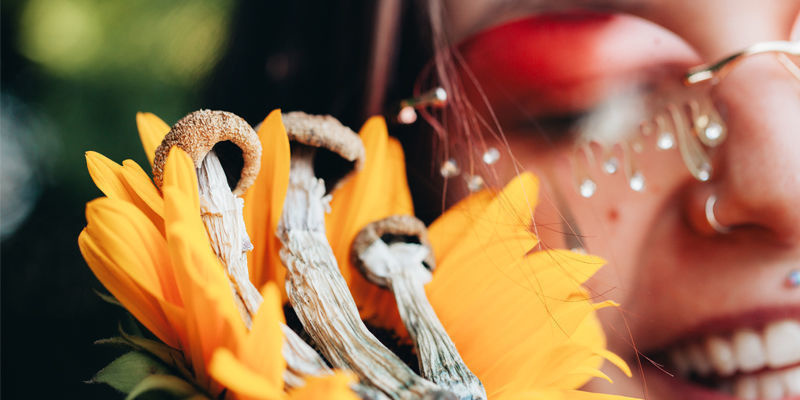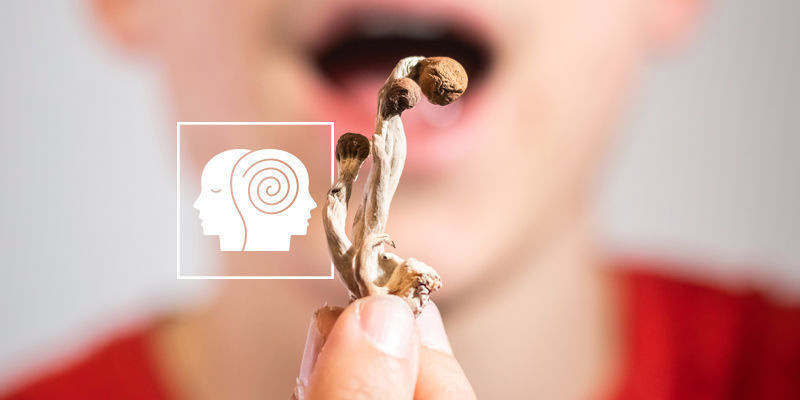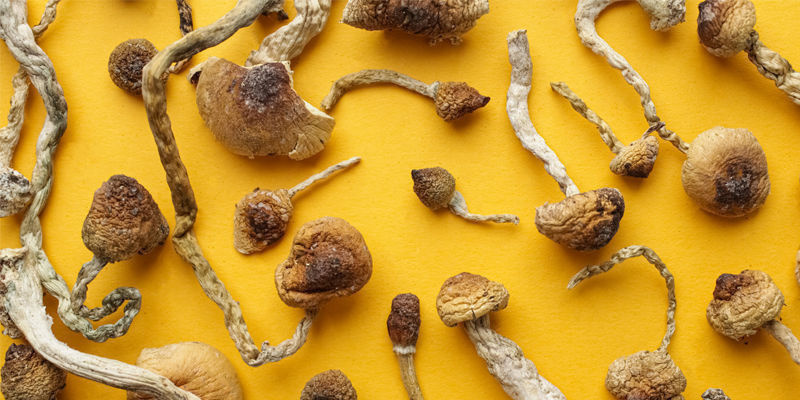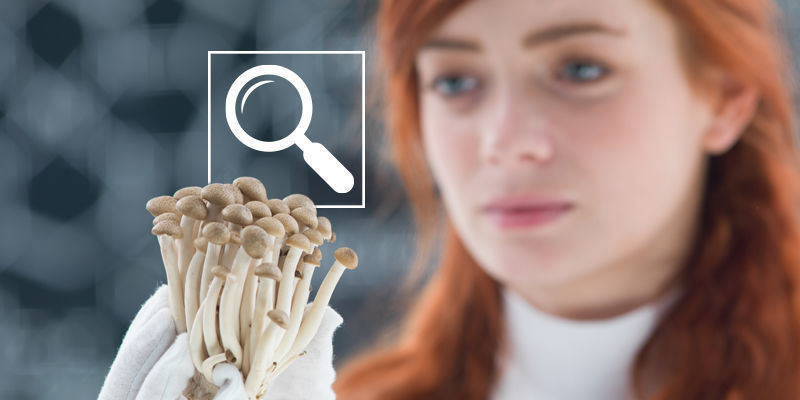
Magic Mushroom Myths: Debunking Common Misconceptions
Magic mushrooms have been used by people for millennia, and yet we still don't have a cohesive world-view surrounding them. So, here we take a look at some myths about shrooms and try to set the record straight.
Magic mushrooms are having their moment in the spotlight, and all for the better! Still, there are some sticky myths that these fungi just can’t seem to shake. So in this article, we’re looking at several of the most damaging magic mushroom myths and misconceptions, in hopes of getting to the truth of the matter.
Whether you’re a die-hard psilocybin supporter or are simply curious to learn how these mushrooms have been misrepresented, keep reading.
The stigma surrounding psychedelics

From the 1970s onwards, psychedelics began to get a very bad rap. There are various explanations for this, most of which stem from developments in the USA. The hippie revolution of the 60s was considered a danger to society, and much of the blame was placed on psychedelics.
Since then, there has been a widespread fear and stigma surrounding these drugs, including magic mushrooms. We’ve all heard of “bad trips” on psychedelics; stories of people losing their minds or encountering demons. Now, we’re not here to say that these drugs don’t profoundly change perception and consciousness, but the reality is that psychedelics like magic mushrooms are among the safest in the world, and really damaging experiences are rare.
Magic mushroom myths

So, with the above in mind, let’s take a look at the most common myths surrounding magic mushrooms.
Myth: Magic mushrooms are addictive
Magic mushrooms are categorically not addictive (Nichols, 2017). When people ingest any serotonergic psychedelic, the brain quickly develops a very strong tolerance—within an hour or two. This is why you can’t trip on psychedelics multiple days in a row without taking exponentially larger doses. Thanks to this mechanism, it’s not possible to get addicted to these drugs, as the brain just won’t let you.
Not only are they not addictive, but there’s a growing body of research that suggests magic mushrooms might actually be useful in helping people with substance use disorders to break their addictions.
Myth: Consuming magic mushrooms can lead to permanent psychosis
Now, we have to tread carefully here. Psychosis can be triggered in vulnerable people by all manner of events, from stress to drugs to almost anything else. But with that said, there is no evidence to suggest that psilocybin specifically triggers psychosis, much less induces a permanent psychotic state.
Nevertheless, we’d strongly suggest that anyone with a history of serious mental illness think very carefully before using any drugs! Our word is not medical advice. It is possible that psilocybin could trigger an underlying illness such as schizophrenia, so it would be foolish to say that it poses no risk. Do your due diligence and consult with your doctor.
Myth: Magic mushrooms are the same as LSD
Shrooms are not the same as LSD. The former contain the active alkaloids psilocybin and psilocin, whereas the latter is lysergic acid diethylamide. While they produce distinct effects, shrooms and LSD both work by interacting with the brain’s serotonin receptors. As such, they can create a cross tolerance. Take shrooms one day, and you’ll find it diminishes the high from LSD the next day. You’ve been warned!
For most people, shrooms tend to offer a less-intense experience compared to LSD. While still safe, LSD has more of a tendency to lead to uncomfortable experiences. In part, this is due to the fact that tiny amounts of LSD can lead to extremely powerful trips, so it’s easy to overdo it with dosing. Mushrooms, while still potent in relatively small amounts, offer slightly more room for error when dosing.
Myth: All magic mushrooms are the same

Absolutely not! There are over 100 species within the Psilocybe genus alone, and due to the unique mix of psilocin, psilocybin, and other alkaloids present in each specimen, the effects can differ greatly between them—it can be surprising how much.
Not only do they differ in alkaloid concentrations, but magic mushrooms can vary greatly in appearance and grow in a wide range of different conditions. For instance, some species like a cold British autumn, while others prefer a tropical climate.
Myth: Magic mushrooms have no therapeutic value
It appears this is not the case. In fact, recent years have seen a significant increase in research surrounding the potential therapeutic value of psilocybin. From treatment-resistant depression, to substance use disorders, to bereavement, and even helping those with terminal illnesses, psilocybin may have the potential to address some of the challenges facing psychiatric medicine (Lowe, 2021).
While governments drag their feet over changing laws surrounding shrooms, more and more people are taking matters into their own hands and using psilocybin themselves. Now, we can’t recommend you do the same without some kind of professional assistance, but we’d definitely recommend you read about it and come to your own conclusions!
Truth over tales: Concluding our magic mushroom myth-busting journey

Shrooms have been misunderstood for far too long. And these misunderstandings are particularly cruel because most of the evidence suggests that these drugs are, at the very least, safe and fun, and at most life-changing for some of those most in need.
Fortunately, views are changing, and pretty rapidly now. With growing scientific and anecdotal evidence, it’s becoming harder to deny that these drugs should no longer be prohibited. With that said, even if you never intend to try them, do some research and determine for yourself what is true, and what is the result of ignorance and fear-mongering.
Shroom Shop
Zamnesia's Shroomshop offers an extensive selection of mushroom cultivation supplies, including spore prints, liquid cultures, grow kits, and much more.
- Lowe H, Toyang N, Steele B, Valentine H, Grant J, Ali A, Ngwa W, & Gordon L. (05/15/2021). The Therapeutic Potential of Psilocybin - https://pubmed.ncbi.nlm.nih.gov
- Nichols DE, Johnson MW, & Nichols CD. (2017 Feb). Psychedelics as Medicines: An Emerging New Paradigm - https://pubmed.ncbi.nlm.nih.gov
-
 4 min
January 17, 2025
Psilocybin vs Psilocin: what’s the difference?
Magic mushrooms contain both psilocin and psilocybin. But what's the difference between these two compounds, and how do they each affect humans? Read along as we offer a primer on the two main...
4 min
January 17, 2025
Psilocybin vs Psilocin: what’s the difference?
Magic mushrooms contain both psilocin and psilocybin. But what's the difference between these two compounds, and how do they each affect humans? Read along as we offer a primer on the two main...
-
 8 min
November 7, 2023
12 Tips For A Great Experience With Magic Truffles
Psychedelics can be unpredictable—the inner journey that commences once magic truffles have been ingested can be a beautiful, awe-inspiring experience that transforms your soul. But it can also be...
8 min
November 7, 2023
12 Tips For A Great Experience With Magic Truffles
Psychedelics can be unpredictable—the inner journey that commences once magic truffles have been ingested can be a beautiful, awe-inspiring experience that transforms your soul. But it can also be...
-
 4 min
October 13, 2022
Can You Build A Tolerance To Magic Mushrooms?
Did you know that it's possible to build a tolerance to magic mushrooms? Fortunately, it's not long-lasting, meaning your trips will be at their peak once again after a short reset period. Find out...
4 min
October 13, 2022
Can You Build A Tolerance To Magic Mushrooms?
Did you know that it's possible to build a tolerance to magic mushrooms? Fortunately, it's not long-lasting, meaning your trips will be at their peak once again after a short reset period. Find out...
-
 4 min
September 18, 2020
Magic Truffles vs. Magic Mushrooms: Who will win?
Magic truffles and shrooms are different yet similar. Both can serve the same purpose, but there are differences between the two that mean one may suit you more than the other. Find out more below.
4 min
September 18, 2020
Magic Truffles vs. Magic Mushrooms: Who will win?
Magic truffles and shrooms are different yet similar. Both can serve the same purpose, but there are differences between the two that mean one may suit you more than the other. Find out more below.











 United States
United States









